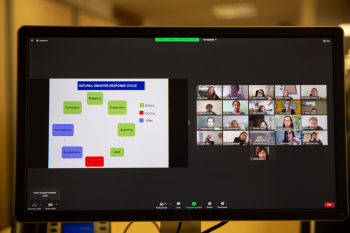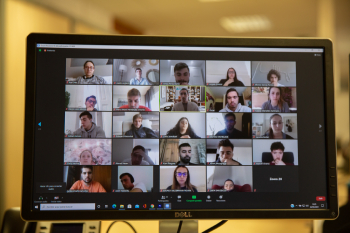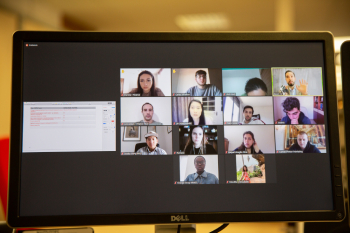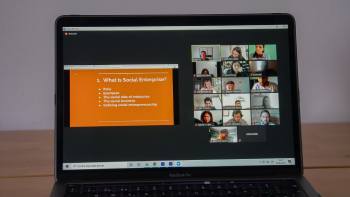EADA's Sustainability Week 2021

In a year dominated by a global pandemic, the sustainability revolution has accelerated faster than expected, while also expanding to include a wider range of environmental and social issues. We talked about this during EADA’s Sustainability Week 2021, from the 22nd to the 26th of March, where international master programmes participants could test their knowledge and dig into key issues in sustainability and responsible management. Under the guidance of well-known experts from all over the world, EADA’s participants had the opportunity to study a topic outside their usual curriculum and also to share the classroom with participants from the rest of the specialized masters.
The EADA’s Sustainability Week provided our participants with actionable insights and solutions for today’s sustainability revolution. These were the issues reflected on during the event:
-The effect of corporate entrepreneurship on sustainability businesses: With this course, participants understood that the concept of innovation is associated with entrepreneurship and, therefore, corporate entrepreneurship. The seminar was given by Dr. Felipe Augusto Jánica, Global Partner at EY. He told about the meaning of innovation. As cited by Goswami & Mathew, “it is the degree to which changes are intentionally implemented that is new to the organization”. An example of this is when companies are fully committed to doing something different in order to get a better outcome. Jánica also reflected on corporate entrepreneurship: “It refers to a process of creating a new business within established firms to improve organizational profitability and enhance a company’s competitive position or the strategic renewals of existing business”.
-Creating value in Latin America through environmental strategy: Through the analysis of different case studies, this course helped participants to combine their strategic thinking abilities with the challenges that firms addressing sustainability face in Latin America. It was hosted by Dr. Fabrizio Novoa, Strategy Professor at Universidad San Francisco de Quito (Ecuador). As he highlighted: “If we do not impose voluntary limits on growth, the rate of destruction of the planet may not significantly alter. In Latin America, different environmental innovations have been implemented through novel business models designed by local entrepreneurs”.
 -Financing climate change: This seminar answered questions such as how financial actors can play a pivotal role in the transition towards a low carbon economy and which compromises, products and mechanisms are required for it. The course was conducted by Dr. Christian Schmaltz, Adjunct Professor at EADA and financial advisor for companies. He said: “Although the financial sector is part of the problem of global warming, it can also be part of its solution. In a capitalist system, money is the key to allocate resources and, therefore, to decide which projects will be carried out and which not. Many projects require financing i.e. from banks, investment funds and insurance companies”.
-Financing climate change: This seminar answered questions such as how financial actors can play a pivotal role in the transition towards a low carbon economy and which compromises, products and mechanisms are required for it. The course was conducted by Dr. Christian Schmaltz, Adjunct Professor at EADA and financial advisor for companies. He said: “Although the financial sector is part of the problem of global warming, it can also be part of its solution. In a capitalist system, money is the key to allocate resources and, therefore, to decide which projects will be carried out and which not. Many projects require financing i.e. from banks, investment funds and insurance companies”.
-Social enterprise business model design: This course was designed by Dr. Yuwei Shi, Professor at Middlebury Institute of International Studies at Monterey and research director at Middlebury’s Center for Social Impact Learning. Shi told our participants about social entrepreneurship, impact investing, sustainability innovation and business: “Like it or not, all companies need to be socially and environmentally conscious and responsible to ensure long-term viability. Society demands it. The technology enables it. And it is good for everyone”.
-Corporate sustainability and competitive advantage: This course was given by Dr Paolo Taticchi, who is a Professor in Strategy and Sustainability & Deputy Director at UCL School of Management. To him, “How to develop a sustainable competitive advantage is a key in today’s agendas of global executives. Leaders should promote sustainability not only in all areas of the organization but among the other players of the industry. They have the responsibility to educate the industry and support smart initiatives in this field, despite not having profits in the short-term”.
 -Making a social impact at the Bottom of the Pyramid (BoP): This seminar focused on the significance and potential of markets at the bottom of the income pyramid in the world. It was conducted by Dr Harvinder Singh, Professor in Marketing with IMT Ghaziabad (India) and IMT Business School Dubai (UAE). Singh highlighted: “More than 5 billion people at the BoP are often ignored by companies, assuming them to be unprofitable. However, companies do not realize that they are collectively a profitable segment because the sheer size of this market is huge. For making an impact on the lives of people at the BoP, companies must provide them quality products at the right price”.
-Making a social impact at the Bottom of the Pyramid (BoP): This seminar focused on the significance and potential of markets at the bottom of the income pyramid in the world. It was conducted by Dr Harvinder Singh, Professor in Marketing with IMT Ghaziabad (India) and IMT Business School Dubai (UAE). Singh highlighted: “More than 5 billion people at the BoP are often ignored by companies, assuming them to be unprofitable. However, companies do not realize that they are collectively a profitable segment because the sheer size of this market is huge. For making an impact on the lives of people at the BoP, companies must provide them quality products at the right price”.
-Activist shareholders and corporate sustainability agendas, the controversial dilemmas for food staples: This course was conducted by the entrepreneur, Professor and corporate leader Iván Cuesta, who gave 3 key points regarding what to do with activist shareholders: “First, build a response together with the company’s teams and experts in legal, financial, communication and investment matters. Secondly, understand activist’s proposals and analyze pros and cons. And, finally, develop a response plan and open a dialogue with them”.
-Sustainable fashion. Challenges, strategies and future scenarios: Dr Julia Wolny, EADA’s Associate Professor and consultant in responsible customer experience design, explored the challenges facing the fashion sector to achieve sustainability. To Wolny, “the systemic shift in this industry needs to take into account both production and consumption practices”. In her opinion, “there are three areas in which fashion industry can make a difference, which is environmental, social and ethical”.
-Managing humanitarian emergencies: In this seminar, participants introduced to the main components required to respond to humanitarian emergencies. It was given by Dr Nines Lima, a doctor who has 17 working experience in humanitarian aid with Médecins Sans Frontières, and Núria Salse, a nurse with more than 15 years of experience in nutrition in developing countries. According to them, “humanitarian aid is an action provided in the moment of a disaster or crisis affecting populations; it is based on three pillars: save lives, alleviate suffering and provide dignity”. To them, “people suffering from a disaster or conflict have the right to live with dignity and to receive assistance”.
 -Digital innovation as a driver for sustainable economies and positive social impact: This course covered current digital trends to provide an overview of the current mobile and AI-first technology landscape. It was given by Richard Ferraro, 4YFN Sales Director and Associate Professor at Barcelona Technology School and UIC. Ferraro insisted on “the role of mobile networks in providing critical infrastructure that spurs inclusive and sustainable development apart from a greater innovation”. In this course, we also listened to the insightful sessions given by Olivier Buigues, CMO at Matelab, Shideh Keshavarz, ArtDirector –her work elaborates the relationship between modern social movements and creativity– and Fela Hughes, Co-Founder of Buengo.
-Digital innovation as a driver for sustainable economies and positive social impact: This course covered current digital trends to provide an overview of the current mobile and AI-first technology landscape. It was given by Richard Ferraro, 4YFN Sales Director and Associate Professor at Barcelona Technology School and UIC. Ferraro insisted on “the role of mobile networks in providing critical infrastructure that spurs inclusive and sustainable development apart from a greater innovation”. In this course, we also listened to the insightful sessions given by Olivier Buigues, CMO at Matelab, Shideh Keshavarz, ArtDirector –her work elaborates the relationship between modern social movements and creativity– and Fela Hughes, Co-Founder of Buengo.
-Technology for circular economy and competitiveness: This seminar was designed by Dr Saman Sarbazvatan, Director of Programmes at École Des Ponts Business School and Senior Advisor of Technology and Business Modeling at Circular Economy Reasearch Center. According to him, “it is time to become the designers, catalysts and leaders of the change, and the first generations who deliberately and willfully redesign and improve the scenery we leave behind us on earth, and beyond, for our children and future generations”.
